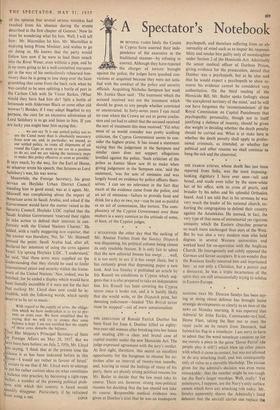THE EXECUTION of Ronald Patrick Dunbar has been fixed for
June 6. Dunbar killed an eighty- two-year-old woman after breaking into her house and stealing £90—a clear and brutal case of capital murder under the new Homicide Act. The judge expressed agreement with the jury's verdict. At first sight, therefore, this seems an excellent opportunity for the hangman to resume his ac- tivities after an interval of twenty-two months; and, bcaring in mind the feelings of many of his party, there are plainly strong political reasons for Mr. Butler to decide that the law must take its course. There are, however, strong non-political reasons for deciding that the law should not take its course. Responsible- medical evidence was given at Dunbar's trial that he was an inadequate psychopath, and therefore suffering from an ab- normality of mind such as to impair his responsi- bility and render him guilty only of manslaughter under Section 2 of the Homicide Act. Admittedly the senior medical officer of Durham Prison, giving evidence for the prosecution, denied that Dunbar was a psychopath, but as he also said that he would expect a psychopath to show re- morse his evidence cannot be considered very authoritative. On the third reading of the Homicide Bill, Mr. Butler spoke feelingly about 'the unexplored territory of the mind,' and he will not have forgotten the 'recommendation' of the Royal Commission on Capital Punishment that psychopathic personality, though not in itself justifying a defence of insanity, should be given due weight in deciding whether the death penalty should be carried out. What is at stake here is whether the death penalty shall apply to profes- sional criminals, as intended, or whether for political and other reasons we shall continue to hang the sick and the abnormal.
* * *










































 Previous page
Previous page